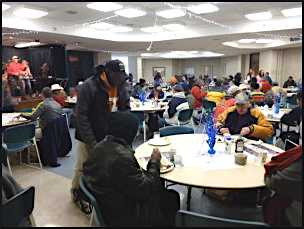
Last month, at Austin’s 25th Homeless Memorial, participants read the names of 187 poverty-stricken people who died in Austin this year. Earlier this month, the Austin American-Statesman published a commentary by House the Homeless president Richard R. Troxell.
He discussed three city ordinances that harm thousands of people for no good reason, and needlessly create conditions that act as barriers to people trying to escape homelessness. There seems to be a belief among law enforcement professionals that the criminal justice system should be wielded as a tool to compel people to seek treatment.
But the resources to treat them don’t exist, so now they still have no treatment, plus a criminal record. Richard says:
It is the responsibility of every municipality to provide for the welfare of every citizen and to protect every citizen. While most cities are making serious efforts to house people who find themselves experiencing homelessness, almost all of those same cities are failing to protect those who they do not house from the winter elements. This is unacceptable.
An oldie but goodie
We take this opportunity to remind readers about a publication by the National Coalition for the Homeless, “Resolve to Fight Poverty,” which is available as a downloadable PDF file. A person might say, “Wait a minute — this thing is dated 2012!” But nobody is steering you wrong. That document is not obsolete — far from it. The unfortunate truth is, everything in there is still relevant.
An enormous amount of poverty needs to be combatted by any means necessary. People need opportunities and encouragement toward education. Activities need to be organized. The media needs to be alerted about events and informed about issues. Public energy needs to be organized and channeled.
January 1, 2018
First Baptist Church at 901 Trinity Street
12:00 noon – 2:00 p.m.
There is still time to participate in the Thermal Underwear Drive and Annual Survey. If you are in Austin, Texas, be a volunteer. One of the perks is a live performance by PJ Lyles and the South Austin Rockin Gospel Project Band. Please donate to the cause of “winterizing” people who find this winter a particularly tough one.
Thoughts for the holidays
Housed people have some strange ideas about people experiencing homelessness. For instance, they might think every homeless person is some kind of trainwreck. Unenlightened citizens might think, “If they were decent people, they would have friends and relatives. Someone they know would take them in.”
Let’s unpack that assumption. For starters, family might be the problem. You can’t imagine the kinds of abusive situations that people are compelled to escape. Or a natural disaster might be the precipitating incident. Fires and floods are not picky, they devour everyone. Friends and relatives might have been hit by the same disaster, and be looking for help too.
A person might want to help, but if they receive government assistance they can’t take in extra people. Visiting rules exist, and if company stays too long, the tenant can be evicted. Once someone is off Section 8, there’s no getting back on.
Even for independently employed people, renting an apartment can come with very strict rules on the lease, and if you break the rules, for instance by sheltering a friend or two, you get thrown out and are homeless also. It may be that the only people who can really help are those who own their homes — unless they are bound by some kind of homeowners’ organization agreement.
Unceasing disadvantage
We hear that intergenerational wealth accumulation is one of the main markers that betray inequity in a society. This is especially true with minorities, who are notoriously prevented by multiple barriers from accumulating and passing along wealth. Intergenerational wealth equals intergenerational help, and at least some members of the lower middle class used to have it to give.
In many families, a solid homestead was maintained by grandparents, where there was always room for a nephew who just got out of jail, or a granddaughter whose husband wanted to kill the baby. Nowadays, Grandma and Grandpa lost the house in the 2008 debacle; he’s probably dead and she’s a bag lady. Support systems have dissolved.
Put yourself in the shoes of a homeless person. A relative or friend might be willing to take you in, but their husband or wife, not so much. People can’t afford that kind of a risk, to break up their marriage and maybe wind up on the streets themselves.
There are a lot of possible reasons why a person has nobody to stay with. The fact that they can’t find a couch to sleep on is not an indictment of the person.
Reactions?
Source: “Commentary: How Austin could atone for policies that harm the homeless,” MyStatesman.com, 12/15/17
Image by House the Homeless
